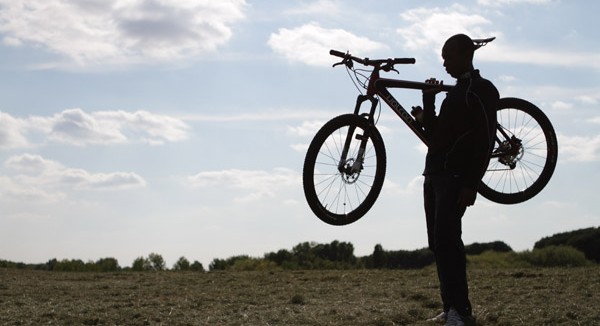DOC: “Rising from Ashes”
Stasis is ignorance and mobility is enlightenment in T.C. Johnstone’s “Rising From Ashes,” a documentary about the Rwandan Olympic cycling team which uses the wheel of the bicycle as a metaphor for the way we live, learn, grow and co-exist amidst individual and systemic horrors.
The team’s coach, cycling legend Jonathan Boyer (referred to throughout as “Jock”), knows much about how to win a race before being called on to move to Rwanda and train a talented group of genocide survivors, but his immobility—in a jail cell for a year in 2002, and on probation for five years after—leaves him bound to personal demons that keep him in a constant state of self-absorption. From the film’s outset, Boyer freely admits he knew nothing about genocide when he was offered the coaching job, and couldn’t even recite Rwanda’s location without consulting a world map first. It’s only after he boards a plane to this country with which he’s so unfamiliar and gets back on a bike that he begins to see the ramifications of the act of riding that extend beyond the advancement of his career.
Boyer’s father’s abandonment of him and his family at a young age and the social stigma that comes with his lewd, criminal behavior with a minor certainly constitute misfortune. Nonetheless, the American lives a relative life of privilege, a far cry from one of incessant bloodshed to which his team has bore witness [insert facts about whose family members died here]. And yet it is this coach’s own personal crosses to bear that enable him to forge common ground with these men whose plight he scarcely identifies with. It’s not that Johnstone’s film implies that a year’s worth of imprisonment and surviving a genocide are comparable experiences——just that cycling and the endurance it necessitates are tools for healing, no matter how big or small the wounds. As Boyer and his team repeatedly stress: “Cycling is about suffering.”
Many moments in “Rising From Ashes” not only reinforce the argument that cycling is “about” suffering–they expand this argument to emphasize that cycling is also “against” suffering. One of the undeniable truths explored here is that competitive sports is intensely political, and although weathering a physically-daunting race can speak volumes about the way in which we experience pain, riding is frequently seen as a means of rejecting the irredeemable harshness of Rwanda’s social conditions. Rwandans young and old, when not shown working or being exposed to the ghastly deaths piling up around them in genocide-centric archival footage, carry bicycle parts to their local handymen, build bikes from scratch (some made entirely of wood) and take to the streets, letting the freedom of movement transport them from the tangible world.
Bicycle wheels are a crucial component of Johnstone’s many establishing shots of Rwandan life as well——some torn apart, held together by children——along with the recurring image of men and children riding side by side at matching speeds. Whereas the torn wheels exemplify the devastation effect of the country’s warring Hutu and Tutsi peoples, Johnstone’s showing of people of those different tribes together undercuts this bleakness with a glint of endearing, if not corny, optimism.
That the causes of the Rwandan genocide are less of a concern of “Rising From Ashes” than the ways in which sports can be a gateway to redemption is something of a double-edged sword. Narrated by Forest Whitaker, the film’s illustration of the Hutu, Tutsi and Twa peoples of Rwanda, whose separation began with the Belgian colonization of the country, isn’t much more than a footnote. It’s likely that this skimming over of significant historical events, rather than a serious look at the tensions between these three groups, was favored because the latter would undermine the message of national solidarity Johnstone and Boyer collaboratively seek to achieve with the former.
But on the grounds of the personal and professional stories it documents alone, “Rising From Ashes” is a worthwhile tribute to the spirit of indomitability. Contrasts between Boyer’s limited knowledge about the plight of survivors of mass murder with said survivors’ limited knowledge about the daunting conditions of Olympic cycling (which, quite amusingly, knocks them on their feet) are made, all the while building toward a middle ground at which men from vastly different worlds gain adequate footing for a nation in desperate need of positive representation on the world stage. The places, wins or losses of Team Rwanda’s riders at the Olympics are of little importance; the fact that they’re there at all is the victory to which the film seeks to lay claim. The unified front of Hutu and Tutsi cyclists and their humbled American mentor implores the bitter and the divided to follow in their bike tracks.
Max Weinstein is a writer and film critic based in Brooklyn. He is the Editor-in-Chief of Diabolique, a bi-monthly magazine focusing on critical perspectives of genre cinema, literature and art. His writings have appeared online and in print in Boxoffice, Cineaste, Fangoria, MovieMaker, and Screem. Follow him here: @maxlweinstein.
news via inbox
Nulla turp dis cursus. Integer liberos euismod pretium faucibua




